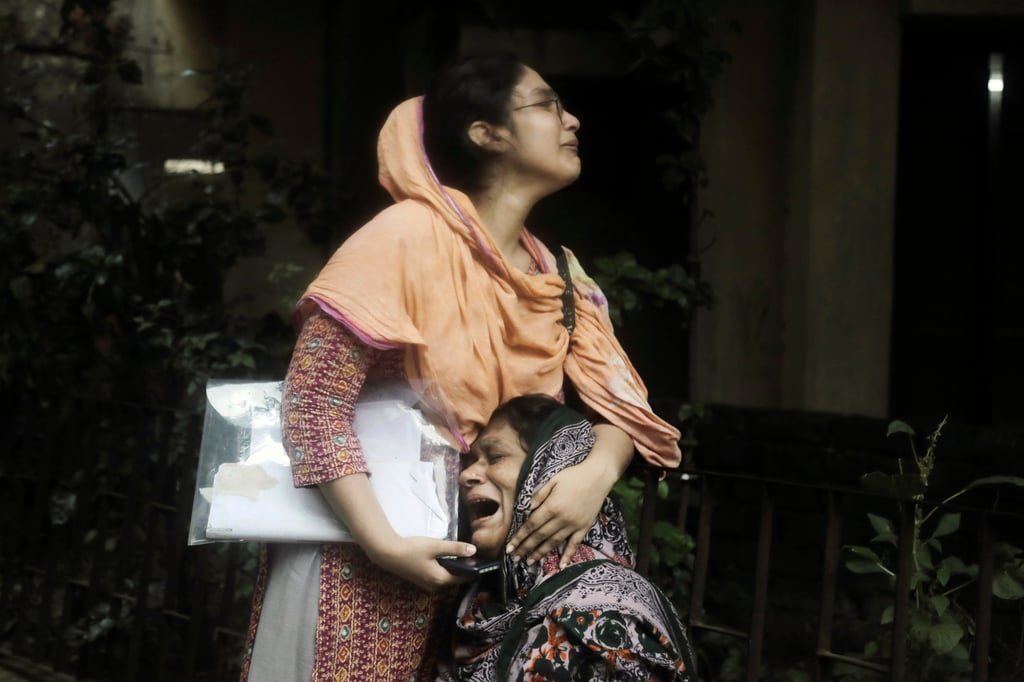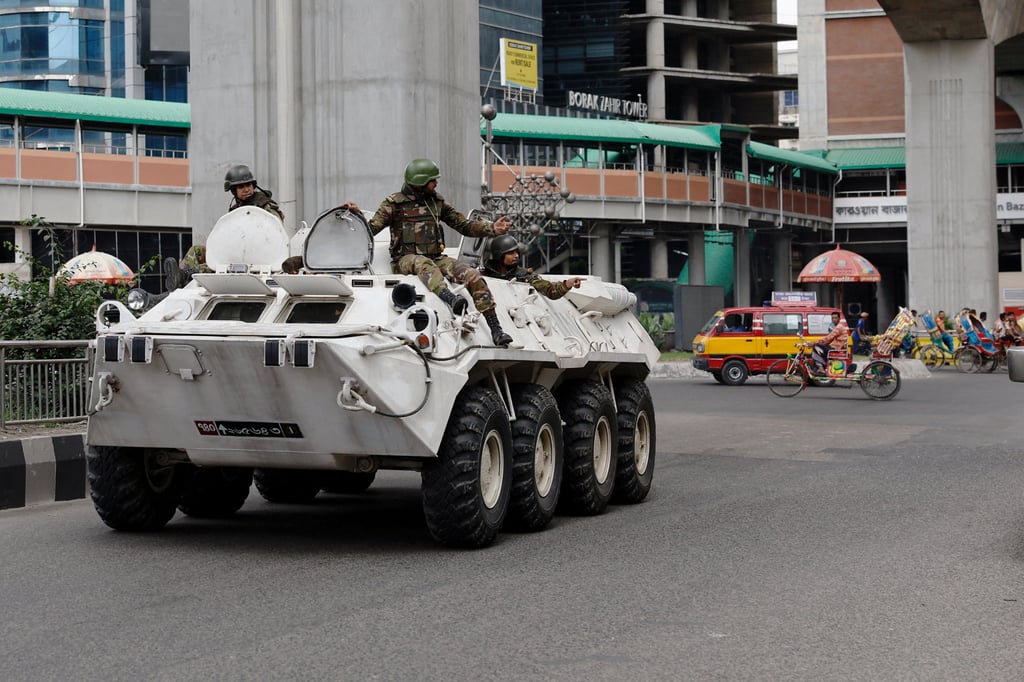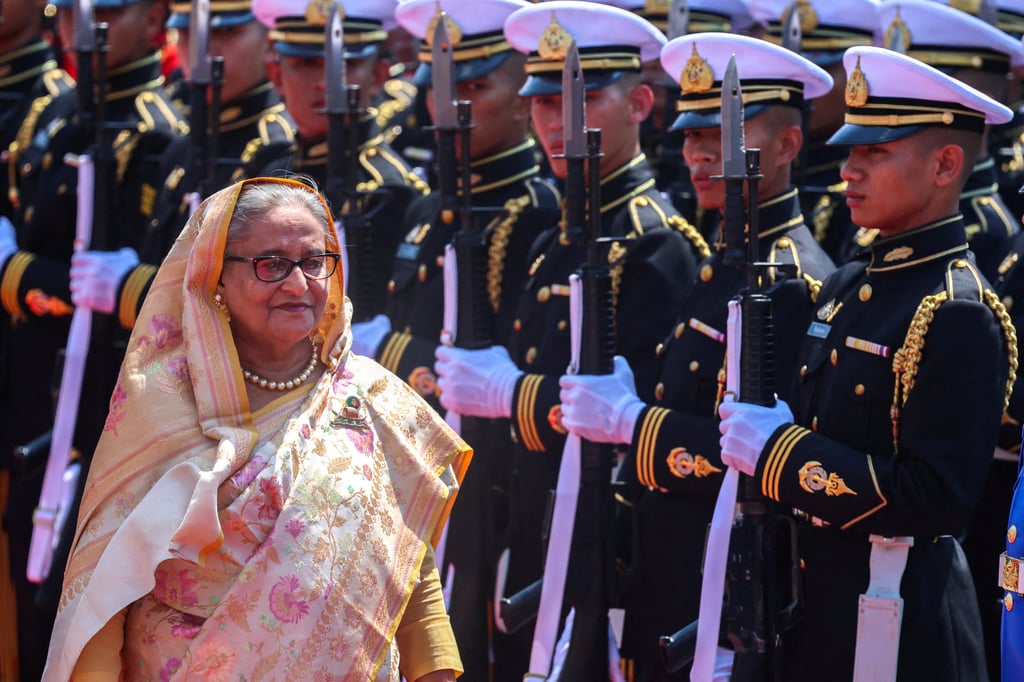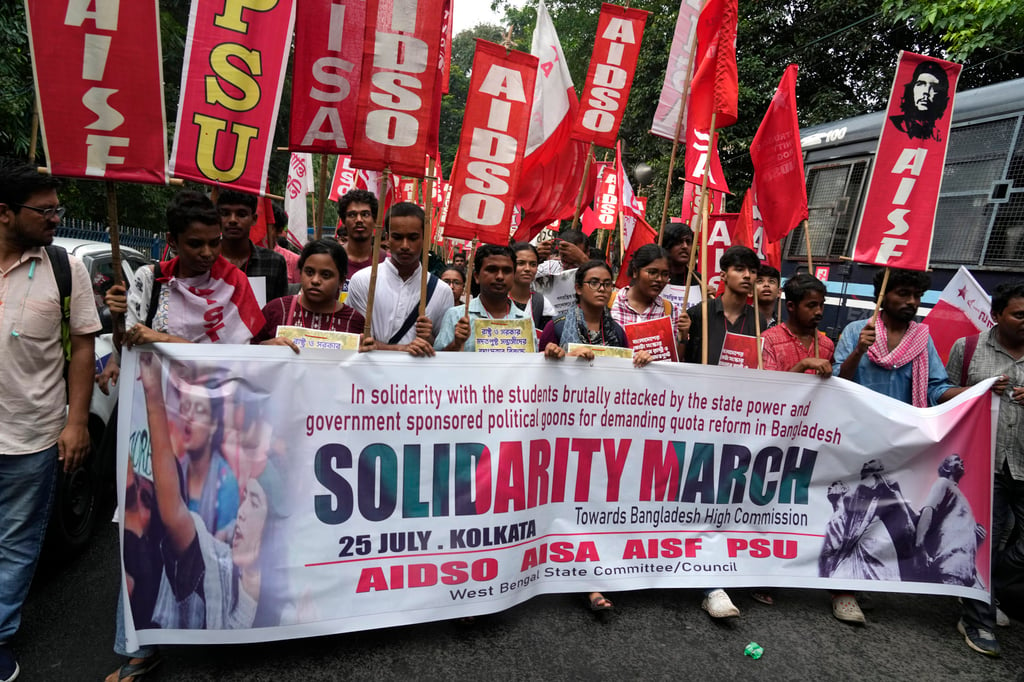Protesters were decrying “discriminatory” quotas for government jobs. The alleged police killing in the clip was among dozens of similar videos that have surfaced on social media in recent days after internet services were restored in some areas.
Following the violence, critics and protesters have called for accountability from the government. Human rights group Amnesty International said on Thursday: “Bangladeshi authorities have continued to use unlawful force against student protesters.
“The continued verification and analysis by Amnesty International of video and photographic evidence that is trickling out of Bangladesh provides a grim picture.”

British political analyst and journalist David Bergman told This Week in Asia: “The protest started as a peaceful one by students demanding the withdrawal of part of the quota for civil service jobs, but on July 16 the police and the Awami League party attacked and shot at the protesters, killing six.
“Now the reported death toll is around 200, and it would appear that, facing such popular anger against them, the only way the Awami League government can remain in power … is if it uses significantly greater state repression.”
The student-led protests began in Bangladesh on July 1, with thousands taking to the streets daily to demand a reform of the so-called quota system in the country – legislation that had previously been introduced in 2018 and upturned soon after but was reintroduced in June this year.
According to the quota system, 30 per cent of civil service jobs – considered the steadiest job option for young Bangladeshis in a country facing high unemployment – would be reserved for the grandchildren of those who fought against Pakistan in Bangladesh’s 1971 Liberation War.
Asking for an abolition of the quota for the descendants of “freedom fighters”, the students demanded a fairer merit-based system of job allocation.
However, the demonstrations descended into violence after police and security forces reportedly fired bullets, pellets and tear gas shells at unarmed students on the streets.

Members of the Chhatra League, the student wing of the ruling party Awami League, allegedly armed with shotguns, machetes and rods, joined the police against protesters.
As the chaos escalated, pitched battles between police and student protesters broke out. On July 18, the government suspended internet services and the next day a curfew was imposed across the country. Army and paramilitary forces were also deployed.
Allegations surface
On July 23, after internet services were partially restored, social media was flooded with posts carrying descriptions and footage of the violent crackdown by police, paramilitary forces and the army.
Many clips show officers firing at unarmed protesters, while others purportedly reveal corpses mutilated by bullets, apparently fired at point-blank range.
According to official figures, the death toll from the violence has crossed 200, but local reports say the figure is up to 500 as many other fatalities are unregistered.
Some 4,500 people have been arrested, with more than half of them from the Bangladesh Nationalist Party (BNP), the country’s largest opposition group.
A Dhaka-based rights activist claimed over the past week hundreds of protesters and opposition party activists had been victims of “enforced disappearance”.
“Some of the victims were released but the whereabouts of many others remain unknown after they were picked up apparently by the security agencies. And the victims are being tortured in custody,” the activist, who did not want to be identified fearing retaliation from security agencies, told This Week in Asia.
“Many student activists and others reported to our group over the past few days that they were in hiding because the security agencies were searching for them … The crackdown against the protesters is still going on.”
One of the protest coordinators, Asif Mahmud, said that “some men” picked him up in the Hatir Jhil area in Dhaka last Friday, demanding that he call off the protests.
“When I said that I would not back out, they gave me an injection when I lost my senses. Whenever I gained consciousness they gave me the injection to make me unconscious again,” said Mahmud, a student of Dhaka University, in a Facebook post on Wednesday.
Mahmud added that the men later blindfolded him and dropped him off at the same place where he was picked up. He is now in a Dhaka hospital to receive medical treatment for what he claims are injuries sustained from “the torture”.
A 21-year-old student protester from Dhaka University told This Week in Asia that he was injured by a police officer last week while unarmed. The student, who declined to be named due to safety concerns, said he had to go into hiding as the police were trying to arrest him.
“I was beaten badly with a baton by the police officer … The government is desperately trying to contain information about the violence that it is inflicting on us and the internet blockade was used as a major tool for that.”

This Week in Asia has reached out to Bangladesh’s home ministry but has yet to receive a reply. The media wing of the Dhaka Metropolitan Police also did not respond to requests for comment.
Bangladesh Prime Minister Sheikh Hasina earlier blamed the BNP for the unrest, arguing she ordered the deployment of police, the army and paramilitary “to protect the students from violence”. She also called the protesting students “militants”.
Students vow to press on
After the Bangladesh Supreme Court last Sunday ordered the scrapping of most government job quotas, the protesting college and university students had thinned from the streets but their leaders said they had not withdrawn from the movement.
On Thursday, coordinators of the anti-quota protests issued a statement saying the demonstrations would continue until their latest set of demands were met.
The statement called for four ministers, including the home and law ministers to be removed from the cabinet, and the policemen and pro-ruling party “goons” who fired on protesters to be arrested and prosecuted for “killing” the unarmed, among other demands.
In a statement on the same day, a team of UN experts urged the Bangladesh government to immediately end the ongoing crackdown against protesters and political opponents.

“We have been alarmed by the large number of unlawful killings, possible enforced disappearances, torture and the detention of thousands of people,” the statement said.
“We are deeply concerned by reports of targeted attacks, threats, intimidation and retaliation by the authorities and government-aligned groups against protest leaders, political activists, human rights defenders and journalists.”
Meenakshi Ganguly, South Asia deputy director at Human Rights Watch, said the security forces in Bangladesh had a long history of human rights violations.
“They persist because the government has never held them accountable, outright denying that the abuses occurred. If Prime Minister Sheikh Hasina is genuinely concerned about her citizens, she should order an independent and credible investigation, and should publicly say that all abuses will be punished,” Ganguly told This Week in Asia.
“Influential foreign governments should urge Prime Minister Sheikh Hasina to ensure that, as promised to the students, those responsible for human rights abuses will be prosecuted.”
